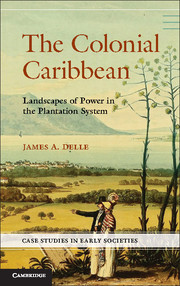Book contents
- Frontmatter
- Contents
- Figures
- Tables
- Preface
- 1 Landscapes of Power in the Colonial Caribbean
- 2 His Majesty’s Island
- 3 The Plantation Mode of Production
- 4 A Class for Itself: Regional Landscapes of the Planter Class
- 5 Contradictions and Dialectics: Village Landscapes of the Enslaved
- 6 Dialectics and Social Change: Plantation Landscapes after Slavery
- 7 Plantation Landscapes in Comparative Perspective
- 8 Conclusion
- References
- Index
4 - A Class for Itself: Regional Landscapes of the Planter Class
Published online by Cambridge University Press: 05 June 2014
- Frontmatter
- Contents
- Figures
- Tables
- Preface
- 1 Landscapes of Power in the Colonial Caribbean
- 2 His Majesty’s Island
- 3 The Plantation Mode of Production
- 4 A Class for Itself: Regional Landscapes of the Planter Class
- 5 Contradictions and Dialectics: Village Landscapes of the Enslaved
- 6 Dialectics and Social Change: Plantation Landscapes after Slavery
- 7 Plantation Landscapes in Comparative Perspective
- 8 Conclusion
- References
- Index
Summary
One of the distinguishing characteristics of Marxist analysis is the contention that social class is the primary structuring principle of capitalist society (Marx 1902, 1976, 1992; Wurst 2006). In Marxian thinking, a social class is a group of individuals whose solidarity emerges from their shared economic interest, which is defined by their collective relationship to the means of production. Understanding how economic structures work, and how certain classes benefit from those structures, leads to the development of what is called class consciousness, an understanding of that shared economic interest (Giddens 1973; Lukacs 1972). When members of a group are able to fully develop class consciousness, they are able to use their collective power to organize society to benefit their mutual interest. In so doing, a ruling class can create and control social, political, economic, and military structures to advance and protect their interests (Patterson 1991). Because other social classes with sometimes conflicting interests do exist, the control over social and economic worlds is often a contested process; thus the maintenance of a capitalist social formation will often require the use of force to simultaneously suppress conflicting interests while advancing the interests of the ruling class (Paynter 1989).
The processes of class formation have long been a concern of archaeologists (e.g., Gailey and Patterson 1988; Kohl 1987; Lull and Miko 2011; Patterson 1988). Because archaeologists believe that the material world plays a key part in shaping the social world, it follows that material culture is intertwined into the definition of social class. In historical archaeology the study of these phenomena has often been framed in terms of social status; however, the traditional scope of historical archaeological investigation, which usually focuses on the scale of the individual household, precludes the analysis of the kinds of collective action that result in and from the formation of class consciousness, although there have been some notable exceptions (e.g., Saitta 2007). To complicate matters, some historical archaeologists have misunderstood the concept of “false consciousness” and assume that the formation of class distinction and privilege means that members of subordinate classes uncritically accept the totalizing social formations imposed on them (Hicks and Horning 2006; Wilkie and Bartoy 2000).
- Type
- Chapter
- Information
- The Colonial CaribbeanLandscapes of Power in Jamaica's Plantation System, pp. 109 - 141Publisher: Cambridge University PressPrint publication year: 2014

